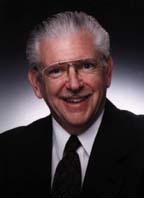 Chiles leads trades efforts with Soviet countries
Chiles leads trades efforts with Soviet countries
 Chiles leads trades efforts with Soviet countries
Chiles leads trades efforts with Soviet countriesJ. Hunter Chiles III (electrical engineering '60) has been named president of the United States Industry Coalition Inc. This membership organization, composed of U.S. companies and universities, works to facilitate commercial interactions between U.S. businesses and entities in the former Soviet Union.
Chiles has more than 30 years of research and management experience in the utilities and energy fields. Through a secretarial appointment in the U.S. Department of Energy, Chiles directed national policy on energy issues, such as natural gas deregulation and restructuring of the electric utility industry.
Gerald Spessard (dairy science '71, M.S.) has designed a protective mask that he hopes will prevent some of the 58,000 facial injuries suffered each year by children playing baseball or softball.
Spessard spent the last 20 years perfecting the GameFace, which he began marketing earlier this year. The mask has been featured on "ESPN Tomorrow" and in Baseball America.
Spessard's own promising baseball career, which included playing in two youth world series, was shattered -- along with his nose -- when he was struck as a teenager by a ball that took a bad hop. Before the accident, he had what he described as "soft" hands, so sensitive that he could catch an egg without breaking it. But after being hit, he froze when the ball came toward him, and it would bounce off his mitt. He soon quit playing baseball completely.
"If I'd had a mask like this, I could have gotten back to shortstop and maybe even have played in the majors," Spessard says.
Spessard's 11-year-old son, Gerry Wayne, has tested the equipment throughout its development, and doesn't play without it. Gerry Wayne modeled the equipment for the ESPN and print coverage.
Sales are steadily increasing, Spessard says. Computer simulations at University of Maryland laboratories have proved that Spessard's mask can prevent the majority of baseball facial injuries, he says. The GameFace is being marketed throughout the United States and also is available online at GameFace.com.
Spessard is co-owner of Keller Stonebraker Insurance Inc. in Hagerstown, Md.

Mike Kaul (aerospace engineering '69) has been named chief executive officer of Empirical Media Corp. in Pittsburgh. Kaul will lead the Internet company as it prepares to launch WiseWire, a web filtering service.
Empirical's new technology will help "solve the most daunting problem of the Internet: too much information," Kaul says. According to him, the new technology provides users a means to access only information they really want. An interactive rating system is designed to "learn" an individual's content preferences and present preferred information sources from a broad range of available Internet sites.
Kaul is former vice president of Oracle Corp., where he worked to develop emerging technology-based businesses in multimedia and electronic commerce. As Oracle's vice president of U.S. marketing, he was responsible for developing market strategies for the company's $750-million U.S. business.
Blacksburg will be celebrating its bicentennial in 1998, and officials are looking for photos to display in a town history exhibit. If you have a photo of Blacksburg taken in the 1970s or earlier that you are willing to lend, please contact Clara Cox, 319-A Burruss Hall, Virginia Tech, Blacksburg, VA 24061-0229. Her phone number is (540) 231-9054 and her fax is (540) 231-8456. All photos will be duplicated and returned.
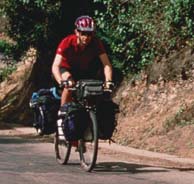
Dodging potholes "big as a Volkswagen," Joe Wiggins (aerospace and ocean engineering '80) pedaled the 688-mile Burma Road in November, part of the first-ever bike trek on the ancient thoroughfare.
For five weeks, Wiggins and three other men camped and pedaled though the lush valleys and mountain forests from Kunmig, China to Lashio, Myanmar (formerly known as Burma). The road's 3-by-5 inch rocks fit together like a jigsaw puzzle in what Wiggins' riding partner called "the purgatory of road surfaces."
The worst thing that happened, Wiggins says, was not being allowed to pedal into Myanmar at the end of the trip. (Visitors are only allowed to enter by flying into the cities.) "The second worst was crashing my bicycle," he says. His bike slipped on the oil that Chinese trucks constantly seem to be leaking, and Wiggins spun out of control, hitting his head. After collecting his wits, Wiggins biked 25 more miles that day.
Wiggins noticed China seemed at odds with itself. "Consumer goods were available anywhere. It was like free enterprise gone amuck. Yet there was no freedom of information," he says.
Wiggins heard about the trip through his job as assistant manager of gallery presentations at the Denver Museum of Natural History, where he scheduled trans-world cyclist Steve Williams to speak. Williams invited Wiggins to accompany him on the Burma Road.
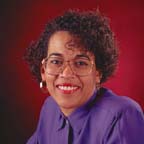
Bevlee Watford (mining engineering '81, M.S., Ph.D.) associate dean for academic affairs and director of Minority Engineering Programs (MEP) at Virginia Tech, received the Charles A. Tunstall Outstanding MEP Award from the National Society of Black Engineers (NSBE) in March.
The society presented the award to Watford in recognition of her significant contributions to the success of African-American students at the university. As MEP director, Watford, a Virginia Tech engineering alumna, has developed numerous programs aimed at improving the environment for minority students in the Tech College of Engineering.
Since Watford became Tech's first MEP director in 1992, the number of black engineering freshmen has increased more than 60 percent. Retention rates for minorities also have improved, particularly at the critical freshman to sophomore level, where the retention rate increased from 51 percent in 1992 to 83 percent in 1994.
In 1996, Watford received the university's Affirmative Action Award in recognition of her work on behalf of minority and women students.
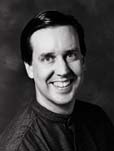
A new IMAX film features a highly detailed computer animation by Francis "Frank" Summers (physics '88). Summers spent two years creating what ultimately became a segment of about a minute and a half in the 35-minute "Cosmic Voyage." The film was nominated for an Academy Award in the Best Documentary Short Subject category.
The 5,000-frame segment Summers created explores the formation of galaxies. He produced the large, super-computer simulation at the National Center for Supercomputer Applications in Champaign-Urbana, Ill.
Summers also served on the scientific advisory panel for the early universe segment of the film, which is being shown at IMAX theatres around the world.
"When scientific data is being transformed into a movie or an exhibit, it's important not to lose the underlying scientific point in an effort to make it look pretty," Summers says.
Summers, a post-doctoral student in astronomy at Columbia University, is working on scientific design of new exhibits at the Hayden Planetarium in New York City. He holds an M.S. and Ph.D. in astronomy from the University of California-Berkeley.
Transferring from managing the grounds of the nation's most visible landmark to managing the grounds around one of the nation's least visible landmarks is not the most impressive job move. But for Melville "Mel" Poole (horticulture '77), it is just right.
Poole managed the 55-acre park around the White House until March, when he was promoted to managing the 5,770-acre Catoctin Mountain Park, which surrounds Camp David.
Poole started his career working at the White House's greenhouse. He moved on after 18 months, but returned 11 years later to manage the grounds for the whole park. As park manager for President's Park, his duties included maintenance and service of the grounds, including the Ellipse, Lafayette Park, the first Division Memorial Area, Sherman Park, and the White House visitors' center. He supervised such things as cutting the grass to lining guests up for the White House tour.
During his time at the White House, Poole met presidents Jimmy Carter, George Bush, and Bill Clinton.
Poole will never forget his first Christmas tree lighting. "Due to a malfunction of a switch, there was a 28-second gap between when President Bush flipped the light switch and when the tree actually lit up," Poole says. "It felt like three days to me. The incident ended up as a television skit on 'Saturday Night Live.'"
In his new job as superintendent of Catoctin Mountain Park, Poole is responsible for maintaining the grounds surrounding the park, monitoring visitors, and conducting resource management programs. He also is involved in helping with security in the surrounding area.
"I'll be an 'outside the fence' guy," he says.
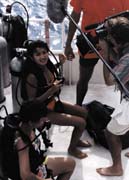
Michelle Krusiek (theatre arts and English '95) has eaten crickets and grasshoppers in Montreal, ridden elephants in India, eaten bush rats in Ghana, and climbed greased poles in Belize. It's all been part of her job as co-host of the Discovery Channel's "Travelers" series.
Since Krusiek landed the job in February 1996, she has traveled to 20 countries for the hour-long program, which airs on the Discovery Channel weekdays at 5 p.m. EST.
"It's a pretty incredible job," she says. "I have to fly around the world, visit different countries, and have a good time."
This theme for the past year's programs was festivals, so Krusiek and her crew spent three weeks out of each month visiting Oktoberfests, saints' festivals, and other celebratory events around the globe.
Krusiek says she enjoyed riding the Indian elephants and didn't mind climbing the greased poles, but eating insects at a Montreal insect-eating festival was a challenge for her. The taste wasn't bad -- something like dried onion or mild anchovies. It was the texture that troubled her. "It was crunchy, like bacon, but scaly," she says. "But the worst thing was seeing a thorax stuck between your teeth after you had eaten."
This year, the program will focus on major metropolitan areas, beginning with Morocco. Krusiek recently moved to the West Coast, where she will continue to work for the Travel Channel and pursue opportunities for an acting career.
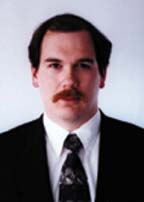
James Talley (mechanical engineering '85) has been honored as a hero by the town of Shelburne, Vt., for rescuing a 92-year-old woman from a fire.
Talley was the first equipped firefighter at the scene of a nursing home fire last November. He joined two policemen who had made unsuccessful attempts to rescue an elderly patient from her burning bed and carried the woman to safety.
"I felt honored to receive the commendation, but I've done other things that were much more frightening than that rescue," Talley says. Just recently, he saved himself and a partner from sliding off a rooftop. The partner, who had limited firefighting experience, panicked and grabbed Talley when flames shot along the roof where they were standing. The two started to slide down the slate roof. "Luckily, I was able to stop us a few inches from the edge," Talley says.
Talley recently was named manager of General Dynamics Armament Systems' Fixed Wing and Gun Systems Engineering, where he is responsible for the safe mounting, operation, and design modifications of machine guns on fighter planes.
Home | News | Features | Research | Philanthropy | President's Message | Athletics | Alumni | Classnotes | Editor's Page